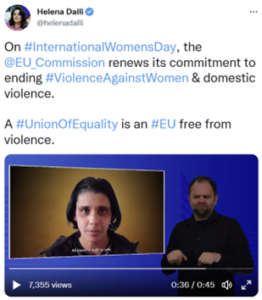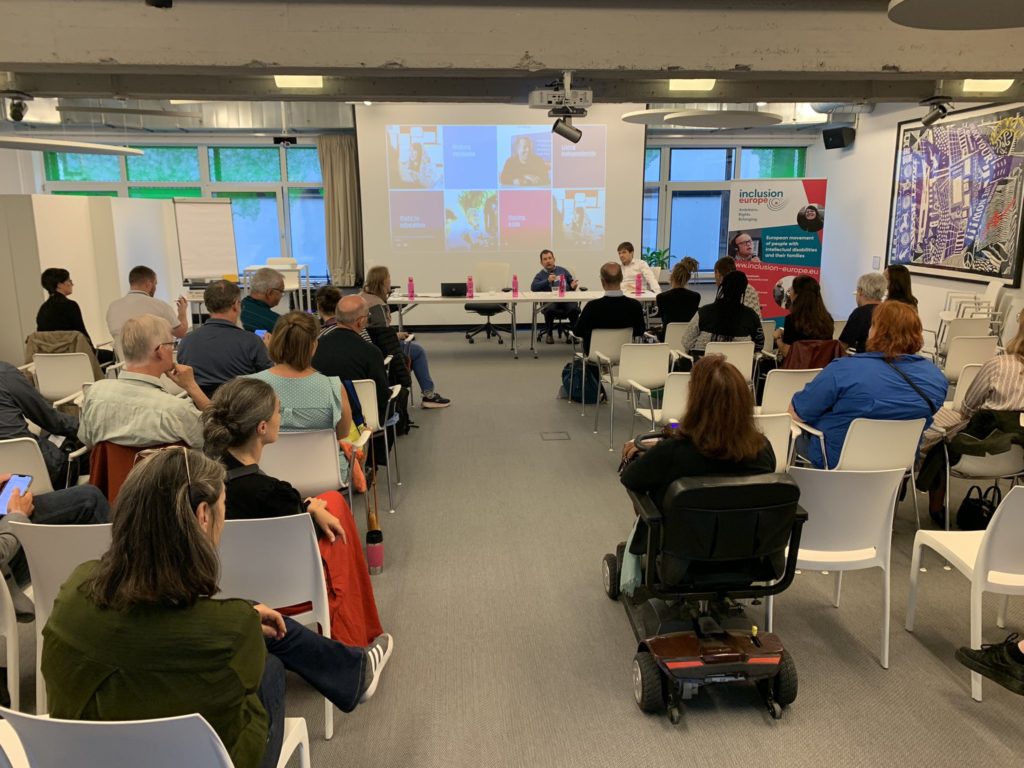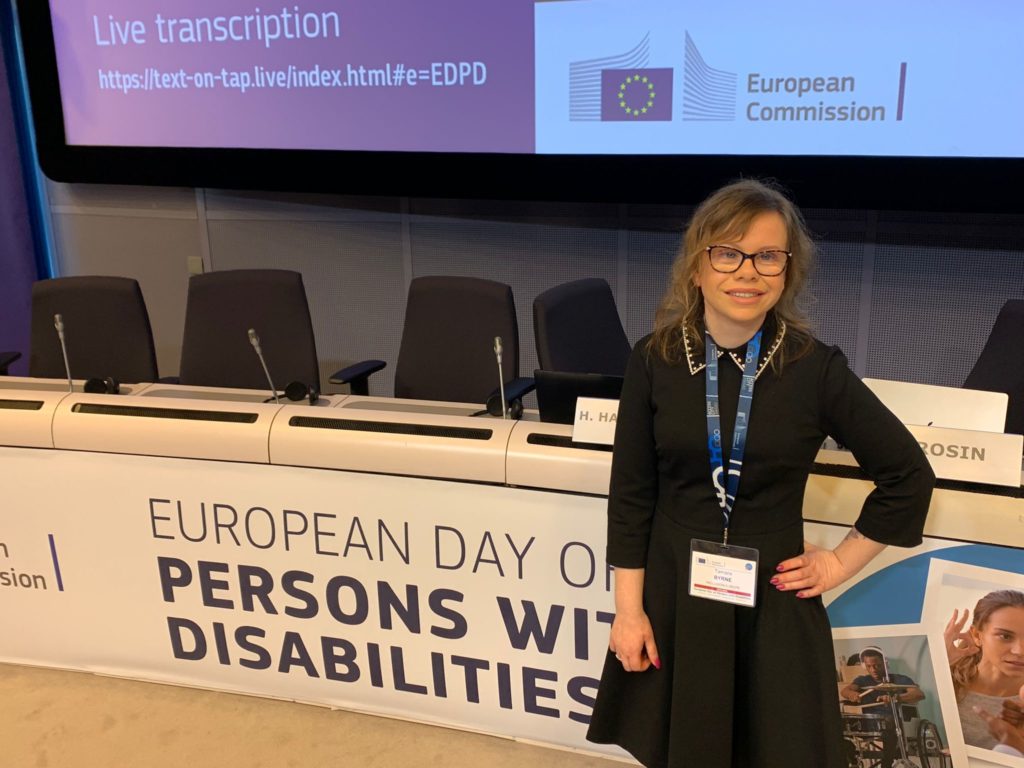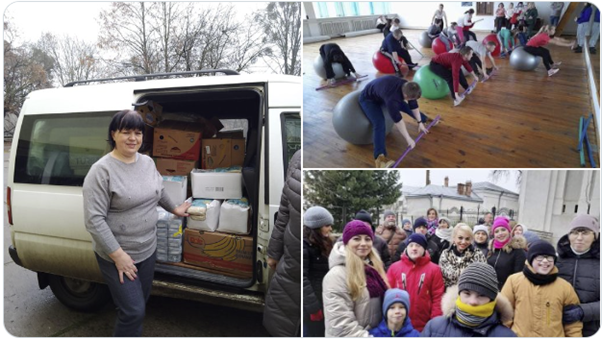Dear members, colleagues and friends.
As I write my usual end-of-year summary, there is only one topic that can be in focus: The incredibly courageous response of the Ukrainian people with disabilities and their families facing genocidal Russian war. And alongside it, the solidarity and support provided by all of you in the European and international Inclusion community.
What Inclusion Europe has been able to do was possible only thanks to all of you who contributed to the emergency support, and those in Ukraine who organised to distribute it.
Inclusion Europe has had a facilitating role, and I am proud of what the team has achieved.
Thank you everyone.
I remain eternally grateful.
“When you know that you are not alone, it is much easier to deal with troubles. Thank you Inclusion Europe for your support! ” – VGO Coalition on Facebook
Of course, there were other things happening during the year. I tried to capture some of them in this wrap-up.
What you can notice, there have been quite a few positive court decisions and other legal or policy developments advancing the rights of people with intellectual disabilities and their families. May the new year bring more such positive developments.
– Milan Šveřepa
January
German constitutional court ruled disabled people must be protected in Covid triage cases. Disabled people must be protected by legally binding guidelines in case hospitals are forced to introduce a triage system. Legislators must create a legal framework that would prevent disabled people from being unfairly treated.
UN Committee condemned Slovakia for treatment of a woman with intellectual disability. The woman was placed in a caged bed.
More in January Include News.
February
Soufiane El Amrani introduced our new strategy for the upcoming years:
- Join us, as we intensify our work to help all people with intellectual disabilities to realise our shared ambitions: Of living in your own place. Having friends. Making your own choices. Being good at something.
The European Court of Human Rights rules in favour of voting rights of people under guardianship. The case was Anatoliy Marinov v. Bulgaria.
- Marinov had lost his right to vote in Bulgaria’s 2017 parliamentary elections after being placed under partial guardianship. Mr. Marinov’s right to free elections has been violated the Court ruled.
The president of North Macedonia walked an 11-year-old girl with Down Syndrome to school to support her in face of discrimination. Parents of other students protested the girl going to the same school as their children.
- “Inclusiveness should not remain just a declarative principle. Prejudice should not be an obstacle in building an equal and just society for all. Empathy is our moral obligation,” the president Stevo Pendarovski said.
- Our posts about this story registered 100,000 combined organic views in less than a week.
On 24 February, Russia launched its full scale war on Ukraine. Our members were calling for help before this day already.
March
Inclusion as a guiding principle for educational reform in Portugal. Since 2008, Portugal has had in place laws envisioning the provision of education for all students, without exception, in their local mainstream school.
- Special schools transformed into resource centres for inclusion, supporting their former students now placed in mainstream schools. Instead of categorising students, it supports the idea that all students can achieve a profile of competencies and skills.
- The country has also seen impressive developments in terms of equity.
- This is from an article highlighted here.
The European Commission made a video about violence against women. Elisabeta Moldovan is one of the women appearing in the video. Elisabeta is a self-advocate and activist from Romania. Elisabeta says in the video: “All places should be safe.”

To support people with intellectual disabilities, Inclusion Europe made first emergency money transfers to the VGO Coalition and other organisations in their network early in March.
“If it wasn’t for the international support, we would hardly be able to cope in this situation. Our heart-felt gratitude from everyone in our network representing 14,000 families. We appreciate that the first support from Inclusion Europe was transferred on 8 March. At the same time 20 other organisations received support.” – Yuliia Klepets, during VGO Coalition reporting conference, 8 December
We also published testimonies from families in Ukraine: One month of the Russian war on Ukraine in the words of families of people with intellectual disabilities.
April
Inclusion Europe Radio launched a new podcast series, called In conversation with…
- New employment package for people with disabilities: In conversation with Katarina Ivanković Knežević
- Quality of life, and services for people with disabilities: In conversation with Julie Beadle-Brown and Jan Šiška
- All Inclusion Europe Radio episodes
Ukraine updates, media coverage and more from April.
May
The second issue of Europe for us! easy-to-read magazine was published. The magazine is available in 7 languages.
The European Commission published its monitoring framework on the 2021-2030 Strategy for the Rights of Persons with Disabilities.
June
Committee of Ministers of the Council of Europe freezes adoption of Additional Protocol to the Oviedo Convention. This was very good news for a campaign we have been part of for years.
We published a report 100 days: Ukrainians with intellectual disabilities and their families surviving the war.
We also published our 2021 annual report.
The Fundamental Rights Agency published its 2022 report, focusing on social rights and Covid pandemic. One chapter is about Developments in the implementation of the Convention on the Rights of Persons with Disabilities. This includes references to our inclusive education complaint against Belgium.
We interviewed Senada Halilčević as part of our End Segregation campaign. Senada talks about her life at institutions, ending segregation, and how participation in the community and independent living is vital for people with intellectual disabilities.
July and August
End Segregation campaign continues:
- László Bercse: Living freely and being members of communities like everyone else.
- Petr Laník: Finally my life is what I want it to be
We also published new issue of Europe for us. And this article by Jyrki Pinomaa.
And this article was published by FEANTSA: If you are being overlooked in normal times, it is unlikely that anyone will take you into account during a crisis.
September
Our Europe in Action conference took place in Brussels.
- “We help each other by sharing our stories”
- “No institution can replace a proper family”
- “Now I support others to get out of institutions”
- It’s everyone’s human right to live in a home of their choice, in a community they choose, close to the people they love
- “Live a life of your own, get education and experience, get a job with proper money”
- It is crucial to better involve self-advocates in deinstitutionalisation
- Olena Kravchenko: We are very grateful supported us from the first days
- Raisa Kravchenko: Do not use Ukraine recovery money for institutions, but for support to independent living

We weren’t too happy with the lack of representation of people with disabilities at EU presidency conference about people with disabilities.
The European Commission published EU Care Strategy.
October
The European Commission presented a new report on investing in education. The report addresses questions, such as: Which education and training measures are most effective in European Union countries? How can the efficiency and effectiveness of spending be improved? How to best evaluate policy decisions?
The UN Committee on the Rights of Persons with Disabilities has found that Italy’s failure to provide individualised support services to a family of persons with disabilities was discriminatory and violated their rights to family life, to live independently and to an adequate living standard.
Two new episodes of the In conversation with… series were published: One about achieving change in social care, one about people with complex support needs.
We also launched our new program of trainings: Tuesday Tutorials.
November
Inclusion Europe organised a training for self-advocates and family members in Czechia. It was about participation in conferences and discussions that matter to them.
The European Commission organised its annual conference European Day of Person with Disabilities. Tamara Byrne represented people with intellectual disabilities among speakers.

The European Court of Human Rights issued its judgment on a case involving the rape, and involuntary termination of pregnancies, of women with intellectual disabilities in Moldova.
- The Court “concluded that the authorities had failed to carry out an effective investigation into the applicants’ allegations of ill-treatment despite it having been reopened on four occasions following their appeals. The inquiry had not factored in their vulnerability as intellectually disabled women exposed to sexual abuse in an institutional context” (a violation of the procedural limb of Article 3, prohibition of torture).
Inclusion Europe won the European Citizen’s Prize from the European Parliament.
Raisa Kravchenko talked about the situation in Ukraine: “If you have a person with intellectual disability in your family, it means you are building a system of support for years. For me it took 10 years to build everyday support for my son. And this system was ruined in one moment.”
December
Last Europe for us of the year: Your own front door: Your way to independence
Update from Ukraine, by Olena Melniyuk: “With the support of Inclusion Europe and VGO Coalition we are able to continue to provide a day-care service for young people who need attention, communication and meet the needs of daily work, creativity, being useful and important to others.”

“You have proved that our common value solidarity isn’t just a word on our website,” writes Jyrki Pinomaa in his end-of-year letter.
We can end with that.
2022 in (preliminary) numbers
650,000 euros fundraised to help people with intellectual disabilities and their families in Ukraine
1 conference with 120 attendees from 27 countries
6 Tuesday Tutorials
1 training on self-advocacy participation
40 speaker contributions to conferences and trainings
28,800 social media followers, 4,450 more than in 2021
100,000 impressions on our post about that North Macedonia story (see February)
74 media appearances (45 last year)
1 new member (Dincat, Spain)
This was 2021 if you must know.
Subscribe to Include and stay up-to-date with news about inclusion and rights of people with intellectual disabilities and their families.





